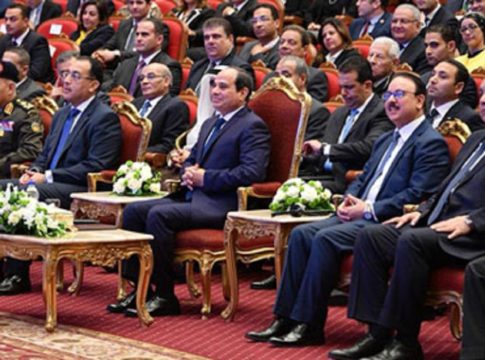With solid steps towards economic progress and firm hands combatting terrorism, President Abdel Fattah El-Sisi leads the way in setting grounds for Egypt’s future through honouring our commitments to Oil companies in a successful bid that’s turning Egypt into an Energy hub, driving the economy’s industrial and business growth towards an open market economy through a shrewd monetary policy, injecting funding to SMEs, expanding the industrial zones network and delivering indicators that prove Egypt’s progress towards safety zone.
On top of this, Egypt is building for the future through its engagement into mega infrastructural projects, being the foundations for Egypt’s long-term development plan, projects that are paving the way towards a stronger built economy. Further more, Egypt’s tourism has picked up in 2017 beyond the past 2 years figures and the stock market promises a continued economic success in 2018.
In the recent monthly survey of business conditions in the Egyptian private sector, released by IHS (a strategic information and analysis service provider) in association with NBD, Daniel Richards, MENA Economist at Emirates NBD, said: “Egypt’s PMI readings turned positive in November, signalling an expansion in the non-oil sector for the first time in over two years. This suggests that the wide-ranging economic reforms embarked upon in November 2016 as part of an IMF-sponsored programme are beginning to bear fruit. Strong sentiment towards future prospects chimes with our view that the Egyptian economy will continue to strengthen over the coming quarters.” Purchasing Managers’ Index (PMI) is a composite indicator designed to give an accurate overview of operating conditions in the non-oil private sector economy. Egypt’s PMI index rose from 48.4 to 50.7, the improvement was the strongest recorded since August 2015.
Output in the Egyptian non-oil private sector grew in November, ending a 25-month sequence of deterioration in response to a higher demand for Egyptian-produced goods and services during November. Inflows of new work returned to growth, recording the fastest expansion for 27 months. Furthermore, demand from foreign sources rose at the fastest pace since the survey began in response to higher output requirements and in anticipation of further growth, non-oil private sector companies increased their buying activity. Quantities of purchases rose at a solid rate overall, whilst pre-production inventories were accumulated at the fastest rate since November 2014.
The Central Bank of Egypt (CBE) announced lifting the cash limits for companies importing non-priority products in a statement announcing that we are back in business as an open market economy, an announcement that comes with a solid increase in reserves from USD 36.723bn at the end of November from USD 36.703bn at the end of October. Further more, the CBE is continuing it’s successful fulfilment to Egypt’s commitments by paying back $2 billion to the African Export-Import Bank on Monday, part of a $3.2 billion loan the central bank had taken from the lender, state news agency MENA reported on Monday. The central bank plans to pay back the remaining $1.2 billion by the end of this month, MENA said. This comes in line with payments made to various Oil companies over the year, which has been reflected as well through the growing interest of Oil companies in coming to Egypt (Minister of Petroleum, Tarek El Molla said that Exxon Mobil’s officials are in talks with the Egyptian Ministry of Petroleum and Mineral Resources in order to invest in the country’s oil and gas upstream sector).
The CBE’s decision should encourage local importers and investors to expand into production by acquiring machinery and raw materials for local or re-export purposes, over the past year it has been a pre-dominant topic to expand into production by various capable importers. On this ground, Egypt has successfully launched its first locally manufactured smart phone at the 21st edition of Cairo ICT 2017, the smart phone has nearly 50% of its components locally produced, the new mobile is manufactured by Sico Technology, our only recommendation is that sustaining such a product needs a continued investment in Research and Development (R&D) to gradually develop our competitive and innovative edge. Such a move towards industry is backed by huge investments made to boost SMEs funding in Egypt, along with a wave of industrial zones that all reflect increased opportunities for industrial growth within Egypt.
Further more, the Ministry of Tourism announced the Launch of the e-Visa portal project for Egyptian tourism, a movement that advocates the current inflow of tourism back to Egypt. According to an unnamed government official speaking with Reuter’s news agency in October, Egypt’s tourism revenues jumped 211.8 percent year-on-year to $5.3 billion in the first nine months of 2017.
Egypt’s stockmarket outperformed its neighbours in Gulf Cooperation Council GCC countries in November. Egypt’s main index gained in value by 1.67% during the month. The surge took place in late November, after the Central Bank removed caps on deposits and withdrawals of foreign currency for importers. Sentiment in Egypt was also boosted by an announcement from Ibn Sina Pharmaceutical Industry, one of Egypt’s largest drug distributors, that it plans to offer nearly 40 percent of its shares in an initial public offering (IPO) in December. This offer is seen as the first of many other IPO’s that will take place in Egypt in 2018, adding to trading volumes and attracting foreign investment promises a continued economic success in 2018.


